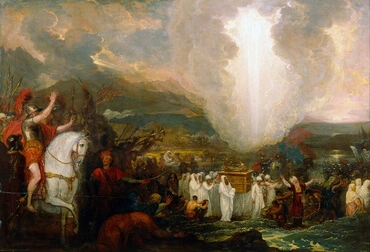1
Ora, come tutti re degli Amorrei che erano di qua dal Giordano, verso Ponente, e tutti i re de’ Cananei, ch’erano presso al mare, udirono che il Signore avea seccate le acque del Giordano davanti a’ figliuoli d’Israele, finchè fossero passati; il cuor loro divenne tutto fiacco, e non restò loro più alcun animo, per tema de’ figliuoli d’Israele.
2
IN quel tempo il Signore disse a Giosuè: Fatti de’ coltelli taglienti, e torna di nuovo a circoncidere i figliuoli d’Israele.
3
Giosuè adunque si fece dei coltelli taglienti, e circoncise i figliuoli d’Israele al colle de’ prepuzi.
4
Or questa fu la cagione per la quale Giosuè li circoncise: tutti i maschi del popolo, ch’era uscito di Egitto, cioè, tutti gli uomini di guerra, erano morti nel deserto per lo cammino, dopo essere usciti di Egitto.
5
E, benchè tutto il popolo che uscì d’Egitto fosse circonciso, non però aveano circonciso tutto il popolo ch’era nato nel deserto per lo cammino, dopo che furono usciti d’Egitto.
6
Perciocchè, dopo che i figliuoli d’Israele furono camminati quarant’anni per lo deserto, finchè fosse consumata la gente degli uomini di guerra ch’erano usciti di Egitto, i quali non aveano ubbidito alla voce del Signore, onde il Signore avea lor giurato, che non farebbe lor vedere il paese, del quale avea giurato a’ lor padri, che ce lo darebbe; paese stillante latte e miele;
7
il Signore fece sorgere, in luogo loro, i lor figliuoli, e quelli circoncise Giosuè; perciocchè erano incirconcisi, conciossiachè non fossero stati circoncisi per lo cammino.
8
E, dopo che si fu finito di circoncidere tutta la gente, dimorarono fermi nel campo, finchè fossero guariti.
9
E il Signore disse a Giosuè: Oggi io vi ho tolto d’addosso il vituperio di Egitto. Ed egli pose nome a quel luogo, Ghilgal, il quale dura fino a questo giorno.
10
E i figliuoli d’Israele, accampati in Ghilgal, celebrarono la Pasqua nel quartodecimo giorno di quel mese, in su la sera nelle campagne di Gerico.
11
E il giorno seguente la Pasqua, in quello stesso giorno, mangiarono del grano del paese, in pani azzimi, e del grano arrostito.
12
E il giorno appresso ch’ebber mangiato del grano del paese, la manna cessò; e i figliuoli d’Israele non ebbero più manna; anzi quell’anno mangiarono del frutto della terra di Canaan.
13
Or avvenne che, mentre Giosuè era presso a Gerico, egli alzò gli occhi, e riguardò, ed ecco, un uomo stava ritto davanti a lui, il quale avea la sua spada tratta in mano. E Giosuè andò a lui, e gli disse: Sei tu de’ nostri, ovvero dei nostri nemici?
14
Ed egli disse: No; anzi io sono il Capo dell’esercito del Signore; pur ora son venuto. E Giosuè cadde sopra la sua faccia in terra, e adorò; e gli disse: Che vuol dire il mio Signore al suo servitore?
15
E il Capo dell’esercito del Signore disse a Giosuè: Tratti le scarpe da’ piedi; perciocchè il luogo, sopra il quale tu stai, è santo. E Giosuè fece così.







